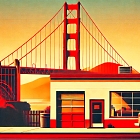The Rise of the Software Creator
In the age of AI, software creators, like content creators, will emerge as the industry’s non-professional creative class.
This is a thesis I wrote about the future of software creation, with nods to the future of software consumption and distribution. There will likely be a part 2 to this essay, soon.
No, this isn’t the end of software, but it is the beginning of a new software era. And I like the media industry analogy, but it’s an evolution, not a death. [1]
Legacy media was dominated by high-budget mass producers of film, television, radio, and print. It was technically complex, expensive, and centrally controlled by a few big players. The internet revolutionized this, lowering costs, increasing access, and giving rise to giant “streaming” and user-generated content platforms.
Historically, software too was technically complex, expensive to build, and largely geared towards professionals and professional organizations. This, coupled with platform constraints and market forces such as network effects and switching costs, created just a few dominant players in any given software sector.
The democratization of media creation and distribution led to the rise of content creators. Similarly, the democratization of software creation and distribution, now accelerated by AI, will usher in the rise of “software creators.”
Content creators are the media industry’s non-professional creative class; their legacy counterparts are traditional specialists: filmmakers, journalists, authors, etc. Like content creators, software creators will make up a significant portion of the industry’s non-professional creative class — self-taught, low-code builders that specialize in concept, creativity, and distribution more than in technical prowess.
They’ll make simple software fast and at high frequency. They’ll have small teams (or no team) and engage directly with their users. Like content creators, there’ll be many kinds of software creators in many mediums. There will be short-form software creators and long-form software creators. There will be educational software creators, entertainment software creators, and lifestyle software creators.
Software can tell a story, sell an identity, and become a companion, just as content creators do. I often talk about the timeless value of taste, and this is where it’ll show. I’ve said that a single well-articulated idea can change your life; now software will be a way that more people can articulate these ideas.
Software creators will make software for consumption too. Their products will deliver short-term value, they’ll be intentionally ephemeral – a flash-in-the-plan or one-hit wonder as a feature, not a bug. We’ll see a lot more software as art, software as a game, software as an experience — software for consumption, not just software as a never-ending utility.
We tend to think of “creators” as broadcasting to the whole world in order to build an audience, but content creators are increasingly going small too. Software creators will see the same benefits. More software will be niche, private, personal, and local – and this will be economically rational. And just like we subscribe to our favorite content creators, we’ll subscribe to our favorite software creators too.
But can software distribution become as seamless as content distribution?
Today’s platforms are still centralized and constrained by the dominant hardware and software ecosystems (i.e. iPhones, macOS, web browsers, gaming consoles, smart devices). With more software builders, we have to expect more experiments in creating new distribution platforms that are more open and interoperable too, along with new infrastructure and integrators to patch it all together. Or in other words, coding isn’t the only hard part; getting software to people, in a way that’s intuitive for the average person, and making it easy to “consume” is hard too. (And this indirectly begs us to fund, discover, and promote more hardware creators too).
Is this more concept than reality? Yes and no. You can already see the seedlings of software creators in sectors like social and gaming. Is this just a piece of the bigger picture to come? Yes, and we can continue debating about who wins in this next evolution of the software world. I believe that the answer will boil down to what it’s always boiled down to: quality, constraints, and competition. But I’m not here to opine on this question, but rather to answer a different one for myself:
In this next evolution of software, who will be on the field? There will always remain a professional class of software builders serving a professional class of software consumers, whether individuals or organizations. But the consumerization of software will extend as far as we can imagine. “Software” will no longer be built just by a professional class for a professional class. Just like content, software will now be created by everyone, for everyone and to serve every kind of need, big or small.
If you liked this essay, you might enjoy these too:







I really enjoyed this post.
Feels like software is a part of the shift from mass to niche then; that it’s becoming more personalized.
And it seems that it’s also part of a big, sweeping trend in which people/users are losing trust in a powerful center; because they are not getting their needs met by that center.
So content, and media and software, yes, but you see the same decentralization (or “fractionalization” or “unbundling”, if you like) happening in:
- crypto — from traditional to centralized finance
- at work
People opting out of or unbundling from traditional, centralized work, is spurring decentralization in these other realms; while those realms becoming more of an option into which to unbundle our work is in turn feeding the unbundling of work. Round and round it goes and I imagine the cycle accelerates as it becomes easier and more socially acceptable to do non-traditional, non-one-job-at-a-time work.
Great post! I like how you talk about “short form”, “long form”, and other dimensions. Would be cool to see a “map” of these emerging software creators. Looking forward to you revisiting this topic as it plays out!